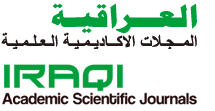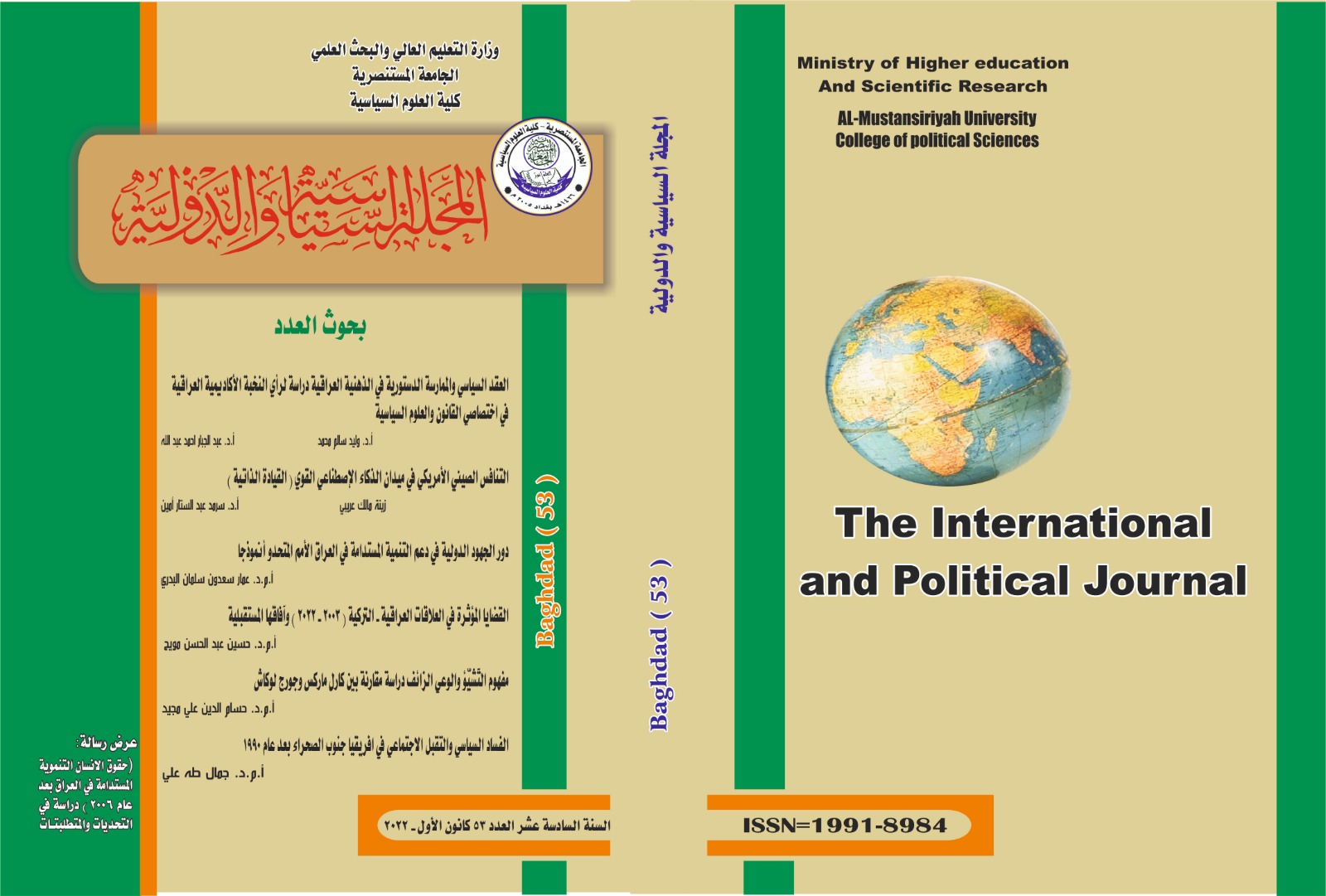The Role of the Cultural Factor in Turkish Soft Power towards Iraq: Reality and the Future
DOI:
https://doi.org/10.31272/ipj.i56.260Keywords:
Turkey, Iraq, Soft Power, the Cultural Factor. .Abstract
Soft power has a major impact on Turkish foreign policy. That is why the Turks focus greatly on the cultural factor and reviving cultural relations between them and the countries of the region in general and Iraq in particular. Turkey attaches great importance to Iraq, as it regard it as its eastern gateway. Turkish cultural soft power in Iraq relies on several means, most notably cultural centers, cinema, drama, education, and modern technological means, in order to mobilize positions that support its policies.
References
العيساوي, مالك محسن خميس. 2017 . "السيادة الوطنية دراسة في تدخل دول الجوار الاقليمي: تركيا نموذجاً." مجلة المستنصرية للدراسات العربية والدولية (العدد 56): ص1. DOI: https://doi.org/10.35155/0965-000-056-001
بن محمد, عزة بنت عبدالرحيم . 2019. "معالم السياسة الداخلية والخارجية التركية نحو منطقة الشرق الأوسط من 2005 إلى 2015." مجلة المؤرخ المصري (العدد 54): ص187.
تول , جونال و محمود جمال عبد العال. 2019. "محاولة تركيا للقيادة الدينية: كيف يستخدم حزب العدالة والتنمية القوة الناعمة للإسلام." مجلة آفاق سياسية (ع43): ص90.
جبير, بتول هليل. 2016. "العثمانية الجديدة والشرق الاوسط." (ع152): ص59.
حسين, صفاء. 2020. "استراتيجية القوة الذكية وأثرها في السياسة الخارجية الصينية." مجلة الجامعة العراقية (ع47): ص74.
سعيدي, السعيد. 2021. "السياسة الخارجية التركية اتجاه إفريقيا في ظل حزب العدالة والتنمية." مجلة العلوم الانسانية (ع1): ص737. DOI: https://doi.org/10.37136/1003-021-001-040
صالح, سماح مهدي. 2020. "السياسة الخارجية التركية تجاه العراق في سياق التحولات الجيوسياسية الإقليمية والدولية." مجلة المستنصرية للدراسات العربية والدولية (العدد 71): ص228.
صالحة, سمير. 2017. ": الرؤية التركية للصراع الإقليمي: سوريا والعراق." مجلة دراسات الجامعة الاردنية 4 (العدد2): ص62.
صلاح , مصطفى محمد واخرون. 2021. "التعاون والتنافس التركي الإيراني تجاه سوريا والعراق. ." مجلة كلية التجارة للبحوث العلمية (العدد72): ص260-261.
عبده, يوسف أحمد. 2016. "القوة الناعمة وأثرها في تعزيز المكانة الدولية لتركية ( 2002 - 2015)." رسالة دكتوراه غير منشورة، جامعة العلوم الإسلامية العالمية، الاردن، ص38.
عبيد, منى حسين. 2015. "العلاقات العراقية التركية وأثرها في استقرار العراق." مجلة دراسات دولية (العدد60): ص89. DOI: https://doi.org/10.36323/0964-008-022-003
عزيز, زيد كريم واخرون. 2020 . "القوة الناعمة في السياسة الخارجية التركية تجاه منطقة الشرق الأوسط: دراسة في الجغرافية السياسية." مجلة جامعة بابل مجلد28 (العدد2): ص216.
عليوي, حسين , و جاسم محمد عبدالكريم. 2017. "العلاقات العراقية التركية والعوامل المؤثرة فيها: إيران أنموذجا." مجلة مركز دراسات الكوفة (ع45): ص72.
عمر, إياد خلف. 2016. "استراتيجية القوة الناعمة ودورها في تنفيذ أهداف السياسة الخارجية الأمريكية في المنطقة العربية." رسالة ماجستير، الأردن، ص52.
غريفيث ، مارتن. 2008. العلاقات الدولية: المفاهيم الأساسية ، الطبعة الثانية. لندن: روتليدج.
معوض, علي جلال عبدالله. 2014. "تغير الأدوار الأقليمية وتأكل القوة الناعمة لحكومة العدالة والتنمية التركية 2011 - 2013." مجلة آفاق سياسية (ع2): ص27.
موسى, بيسان مصطفى. 2016. "الدور الإقليمي لتركيا في ظل الثورات العربية." مجلة دفاتر البحوث العلمي. DOI: https://doi.org/10.37218/1426-000-008-007
نورالدين, محمد . 2020. "المشروع التركي في المنطقة بين الهيمنة والعسكرة والتدويل من القوة الناعمة إلي القوة الخشنة." مجلة شؤون عربية (العدد181): ص83.
هايدن ، كريج. 2012. بلاغة القوة الناعمة: الدبلوماسية العامة في السياقات العالمية ، دراسات ليكسينغتون في الاتصال السياسي . دكتوراه في الطب، ليكسينغتون بوكس: جامعة لانهام، ص 46-47.
هيرمان ، ريتشارد. 2013. التصورات ونظرية الصورة في العلاقات الدولية ، الفصل. 11 في دليل أكسفورد لعلم النفس السياسي ، الطبعة الثانية. أكسفورد: مطبعة جامعة أكسفورد.
ياسين , أمناي , و حسناء الفراعني. 2022 . " القوة الناعمة الأمريكية: العولمة والشبكات الاجتماعية: مقاربة في سيكولوجية الهيمنة من الدولة إلى الأفراد." المجلة المغربية للعلوم الاجتماعية والانسانية (ع19): ص43-44.
المصادر باللغة الانكليزية
Al-Issawi, Malik Mohsen Khamis. 2017. "National Sovereignty: A Study in the Intervention of Regional Neighboring Countries: Türkiye as a Model." Al-Mustansiriya Journal of Arab and International Studies (Issue 56): p.1.
Bin Muhammad, Azza bint Abdul Rahim. 2019. “Turkish Domestic and Foreign Policy Features towards the Middle East from 2005 to 2015.” The Egyptian Historian Journal (Issue 54): p. 187.
Toll, Jonal, and Mahmoud Gamal Abdel-Al. 2019. “Turkey’s Bid for Religious Leadership: How the Justice and Development Party Uses the Soft Power of Islam.” Political Horizons Journal (p. 43): pg. 90.
Jubair, Batool Halil. 2016. “Neo-Ottomanism and the Middle East.” (p. 152): pg. 59.
Hussein, Safaa. 2020. “Smart Power Strategy and Its Impact on Chinese Foreign Policy.” Iraqi University Journal (p. 47): p. 74.
Saidi, happy. 2021. “Turkish Foreign Policy Towards Africa Under the Justice and Development Party.” Journal of Human Sciences (p. 1): pg. 737.
Saleh, Samah Mahdi. 2020. “Turkish Foreign Policy towards Iraq in the Context of Regional and International Geopolitical Transformations.” Al-Mustansiriya Journal of Arab and International Studies (Issue 71): p. 228.
Salha, Samir. 2017. “Turkish Vision of Regional Conflict: Syria and Iraq.” Journal of University of Jordan Studies 4 (Issue 2): p. 62.
Salah, Mustafa Mohamed, et al. 2021. “Turkish-Iranian Cooperation and Competition towards Syria and Iraq.” Journal of the College of Commerce for Scientific Research (Issue 72): pp. 260-261.
Abdo, Youssef Ahmed. 2016. “Soft Power and its Impact on Enhancing the International Position of Turkey (2002-2015).” Unpublished PhD thesis, International Islamic Sciences University, Jordan, p. 38.
Obeid, Mona Hussein. 2015. “Iraqi-Turkish Relations and Their Impact on Iraq’s Stability.” Journal of International Studies (Issue 60): p. 89.
Aziz, Zaid Karim, et al. 2020. [Soft Power in Turkish Foreign Policy towards the Middle East: A Study in Geopolitics]. University of Babylon Journal, Volume 28 (Issue 2): Pg. 216.
Aliwi, Hussein, and Jassim Muhammad Abdul Karim. 2017. “Iraqi-Turkish Relations and the Factors Influencing Them: Iran as a Model.” Journal of the Kufa Studies Center (p. 45): p. 72.
Omar, Iyad Khalaf. 2016. “Soft Power Strategy and Its Role in Implementing US Foreign Policy Objectives in the Arab Region.” Master's thesis, Jordan, p. 52.
Griffiths, Martin. 2008. International Relations: Key Concepts, 2nd ed. London: Routledge.
Moawad, Ali Jalal Abdullah. 2014. “Changing Regional Roles and Erosion of the Soft Power of the Turkish Justice and Development Government 2011-2013.” Political Horizons Journal (p. 2): p. 27.
Musa, Bisan Mustafa. 2016. “The Regional Role of Turkey in Light of the Arab Revolutions.” Journal of Scientific Research Notebooks.
Nordin, Muhammad. 2020. “The Turkish Project in the Region Between Hegemony, Militarization, and Internationalization, From Soft Power to Hard Power.” Arab Affairs Journal (Issue 181): p. 83.
Hayden, Craig. 2012. [The Rhetoric of Soft Power: Public Diplomacy in Global Contexts], Lexington Studies in Political Communication. MD, Lexington Books: Lanham University, pp. 46-47.
Hermann, Richard. 2013. altasawurat wanazariat alsuwrat fi alealaqat alduwaliat [Perceptions and Image Theory in International Relations], Ch. 11 in The Oxford Handbook of Political Psychology, 2nd ed. Oxford: Oxford University Press.
Yassin, Amnai, and Hasnaa Al-Faraani. 2022. "American Soft Power: Globalization and Social Networks: A State-to-People Approach to the Psychology of Hegemony". Moroccan Journal of Social and Human Sciences (p. 19): pp. 43-44.
Additional Files
Published
How to Cite
Issue
Section
License

This work is licensed under a Creative Commons Attribution 4.0 International License.
Journal Policies
All articles published in the International and Political Journal are licensed under a Creative Commons Attribution 4.0 International License. This means that the Authors can:
The journal allows reuse and remixing of content in accordance with a Creative Commons license.
Copy and redistribute the material in any medium or format.
Policy of publishing in The International and Political Journal
The journal is committed to the ethics of scientific publishing, and according to the publication ethics report of the journal.
The decision to publish is based on the value of the scientific research, to what extent it meets the conditions of publication approved, the declared policy of the journal, and its specialty.
It is based on the principles of the scientific honesty, and originality of research submitted for publication. It deals with the names of reviewers and their reports with great confidentiality.
The opinions published in the journal reflect the views of the authors, and not necessarily reflect the opinion of the editorial board.
The journal does not adhere to the publication of whatever comes to it. The time and place of publication are subject to technical considerations adopted in the editorial plan of the journal.
The journal does not abide to return the research papers to their owners whether accepted for publication or not.
The researcher is to be provided with the acceptance of publication within about 24 WEEKS. As for publication, the editorial board reserves its right in priority of publishing. The arrangement of the research papers in the same issue is subject to technical standards.
Diversify of publishing papers from solid universities and scientific centers from inside and outside Iraq is preferable.
The journal maintains hard copies and electronic archive of the published issues in addition to the publication of the research papers.
The journal also publishes the issues electronically through the website of the journal, and the official website of the Iraqi academic journals, and makes it possible to download. Thus, documenting the intellectual property of the research papers and publishing them internationally is achieved.
Terms of publication may be modified when necessary with no previous notice.
The researcher obtains a copy of his research paper. If he wishes to buy acopy of the journal, the volume costs ID 10000 from inside Iraq and $8from the outside.
The Editorial Board considers that the researcher who submits his research paper for publication in the journal has already read the terms and conditions of publication and agreed on them.
The journal publishes the research papers of the postgraduate students in special issues for this purpose.
Stages of editing and publishing:
The researcher undertakes that his research has never been published before, and has not been submitted for publication to other sides until the end of the evaluation procedures and the acceptance of publication in the journal.
The research papers submitted for publication are to subjected for preliminary examination by the editorial board to determine their suitability for the journal specialization, its policy and the safety of scientific research procedures, and then to indicate its eligibility for scientific evaluation. The editorial board may apologize for accepting the research all together or require the researcher to amend it in accordance with the journal policy before sending it to editors.
After conducting the scientific evaluation, the research paper returns back to the researcher to make the required amendments within a maximum of two weeks.
A copy of the final research paper is to be submitted to the secretariat of the journal a hard copy and a soft copy on a CD, in both Word and PDF format. The researcher is fully responsible for the typing and linguistic mistakes after submitting the full research paper on a CD.
Plagiarism checker
All research papers are subjected to Turnitin program to uncover plagiarism before being sent to scientific evaluation. The researcher undertakes a written pledge to take the legal and moral responsibility, in the event of the emergence of plagiarism or taking from the efforts of other researchers, without a reference to them. The journal uses appropriate anti-plagiarism software, such as Turnitin to check for plagiarism.
Dealing with Allegations of Research Misconduct
The Journal shall take reasonable and serious steps to identify and prevent the publication of papers where research misconduct has occurred, including plagiarism, citation manipulation, and data falsification/fabrication.
Scientific Evaluation:
Scientific evaluation strengthens the research paper submitted to the journal and helps to take the appropriate decision by the editorial board to publish it. It also benefits the researchers to improve and correct their research papers.
The research paper is sent to three evaluators in the same specialty to evaluate












